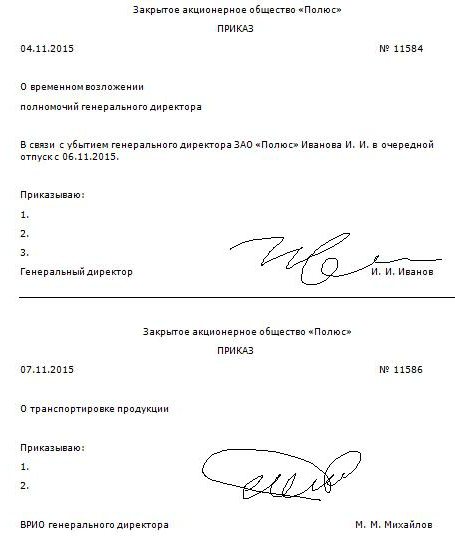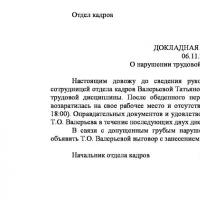Interim is an interim
And do the paperwork? What are these concepts, what do they mean? What is the difference between an acting director and an acting director? These and other questions will be answered in the article.
What is vrio?
Quite often there are situations when the head of the organization goes on vacation and transfers his duties to one of the employees. The question arises: how to correctly and correctly arrange everything? The fact is that the Labor Code of the Russian Federation does not contain clear language on the temporary replacement of an acting person. To begin with, it is worth understanding what an interim is.
Interim - it is like "temporarily Interim is an additional work that will be performed by an employee of the organization with his official consent. As a rule, it is an order where the employee leaves his signature. It is also worth noting that the additional duties assigned to the employee should not go outside the working day.This is also regulated by the Labor Code of the Russian Federation.At the same time, the interim employee receives a salary - his main and for the actual position held.
What is i. O.?
And about. is the acting person. It can be any member of the organization. It is appointed in accordance with the agreement. As a rule, the position and O. are occupied by people who are able to optimally and effectively perform the duties of superiors. And about. become such persons as deputy, senior assistant, etc.
Create a position and O. possible in several ways. Here are two main options:
- An order for the enterprise, when, as a rule, a free vacancy does not open. In fact, the authorities themselves appoint themselves and. O.
- An order after a meeting of directors or a general meeting. This situation is possible when there is a vacancy. At the same time, the decision on the appointment of a candidate for the post of director must be made exactly one month in advance.
Vrio and I. o.: main differences
Finally, it is worth considering one of the most important questions: what is the difference between interim and IO? The differentiation of these two concepts is spelled out in articles 151 and 74 of the Labor Code of the Russian Federation. True, the provisions of these two articles are not entirely well honed in practice, which is why problems often arise.

As mentioned above, the main difference between the two concepts under consideration is the way in which duties are performed. So, if the acting is a person replacing the boss, then and. O. - this is a person who fully performs all the management functions assigned to him up to a certain point. At the same time and O. may well take the place of the chief in the future. Vrio does not have such an opportunity.
Of course, there are many other points that point to the differences between the concepts. Regulates them, of course, the Labor Code of the Russian Federation. What are these moments? This will be discussed further.
Additional differences between and. O. and interim
Often the two concepts under consideration are positioned as synonyms. This, of course, is fundamentally wrong. Probably, it is worth considering in more detail the differences between interim and IO. What is the difference between these two terms?

- Responsibilities. And about. - a person who, in fact, is transferred to a completely new job. Meanwhile, a person temporarily acting (acting) can also combine his commanding functions with the main position.
- Time frame. Interim is a person who acts exactly until the moment the head of the organization returns. Face and. O. is obliged to hold the position of leader exactly until a person is found who will finally take the place of the head. Often and. O. he himself becomes the leader after some time.
- Vacancy. Acting is a temporary appointment in the absence of the boss, and. O. - when there is no leader at all.
Thus, the difference between and. O. and the vrio is not so great. It's all about the formalities for the correct filling of documents.
When to use vrio and and. O.
The positions in question are not always used. There are certain requirements according to which persons acting and acting are appointed. O. It is worth considering in more detail when it is necessary to use these terms.

Temporary performance of duties is applied when the head:
- sick;
- went on vacation;
- temporarily unable to perform their duties.
The performance of obligations applies when:
- the position of the head is vacant and a person is being searched for this position;
- the position of the head is elective and for some time a certain person needs to work as an and. O.
Probably, there may be other situations in accordance with which certain persons are appointed to the position and. O. or vrio. Nevertheless, all of the above points are spelled out in the Labor Code of the Russian Federation, which is why it was worth pointing them out.
Proper design of acting and acting. O.
Problems with the concepts under consideration often occur due to their incorrect design. Employees of various organizations do not fully understand exactly how to fill out forms and. O. and vrio. How to write and execute documents for the performance of duties? The answer to this question will be given below.
In fact, everything is quite simple. First of all, everything depends on who exactly is the person whose duties must be performed. If this is, for example, the general director, then it is written like this: "Acting general director (further signed) I. I. Ivanov." The same, but with the appropriate design, if the positions of the head, rector, etc. are replaced.
An example can be seen in the photo below.

If the document is addressed to a foreign person, then "acting" and "acting." should be replaced with the appropriate notation. In English it will look like this:
- interim - Interim Director General;
- And. O. - Acting Director General.
Thus, the question is how to write interim and and. Oh, it turns out to be pretty simple.
The problem with the design of the vrio

The boss goes on vacation, an interim is appointed. But suddenly the leader suddenly returns. It would seem that nothing terrible is happening. The activity of the enterprise is not paralyzed, not terminated. But suddenly it turns out that, although the acting director was appointed, the director himself is entirely dependent on the general meeting. What to do with the face of the interim? How to do it right? After all, this situation can be corrected only within the framework of the enterprise itself. However, one important point should be taken into account: it is imperative to state in the Charter of the organization that the acting director must be appointed with the consent of the entire general meeting, and not just the director.
Otherwise, there shouldn't be any problems. It is worth noting that embarrassment with acting occurs much less frequently than with and. O. This is mainly due to the fact that the temporary performance of the duties of a person does not at all mean the termination of the activities of the leader himself.
Issues with formatting and O.
Often the following situation occurs: the director is dismissed or removed from office, a person is appointed and. O. After some time, it turns out that the director was reinstated, or was never fired at all. What to do in this situation? In this case, you will have to repeat the whole procedure again. You need to take the form (P14001) and go with it to the notary. After that, you need to register all the changes that have occurred in the bank and the tax office. It turns out that nothing particularly terrible seems to be happening. But, of course, you will have to suffer for some time with the documents.

The next embarrassing situation that may arise is the end of the deadlines and. about., when a person in the place of the chief has not yet been found. In principle, there is nothing terrible in such an incident. Both banks and tax inspectorates quietly compromise with the organization, agreeing to extend all the necessary deadlines. However, it is always worthwhile to appoint a person to the position of leader in a timely manner.
 Ready-made business plan with calculations using the example of a web studio
Ready-made business plan with calculations using the example of a web studio Registration of an internal memorandum: sample document and drafting rules
Registration of an internal memorandum: sample document and drafting rules Break even. Formula. Example of model calculation in Excel. Advantages and disadvantages
Break even. Formula. Example of model calculation in Excel. Advantages and disadvantages Advance report is ... Advance report: sample filling
Advance report is ... Advance report: sample filling How to stitch documents with threads by hand?
How to stitch documents with threads by hand? Disciplinary sanction for non-fulfillment of official duties
Disciplinary sanction for non-fulfillment of official duties Binding your book
Binding your book